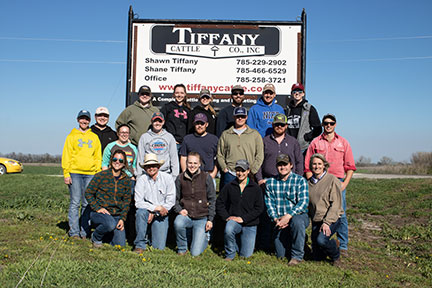Feedlot Boot Camp Cultivates Career Opportunities
 MANHATTAN, Kan. – Kansas ranks third in the nation for cattle on feed with 2.33 million head. The Kansas cattle feeding industry is a growing and expanding sector that is hungry for trained professionals.
MANHATTAN, Kan. – Kansas ranks third in the nation for cattle on feed with 2.33 million head. The Kansas cattle feeding industry is a growing and expanding sector that is hungry for trained professionals.
Kansas State University's (K-State) Animal Sciences and Industry (ASI) department students now have the opportunity to develop their knowledge, skills and professional relationships in feedlot management as part of the new program entitled the "Kansas State University Undergraduate Feedlot Boot Camp and Teaching Program," made possible through sponsorships by Midwest PMS, Zoetis, Rabo AgriFinance, Phibro Animal Health, several Kansas feedlot operations, and K-State's ASI department. Dr. Pete Anderson, Midwest PMS, with the assistance of Drs. Karol Fike and Larry Corah, developed this program with the intent to help meet the critical need for trained professionals in the feedlot industry.
Twenty students enrolled in the spring 2019 course returned early from winter break in order to attend the boot camp, hosted Jan. 14-17 in and around Garden City, Kansas. Participating feedlots included Reeve Cattle Co. Inc., Garden City; Finney County Feedyard, Garden City; and Poky Feeders, Scott City. While on site, students gained insight to receiving and processing cattle, finding and treating sick cattle, cattle handling and comfort, facility design and evaluation, feed mill operations and software, commodity storage and handling, bunk reading, feed calling, and maintenance, as well as other factors contributing to the success of a cattle feeding operation.
ASI junior Shane Newton says he enjoyed seeing each operations' various business models with the same end goal of being the most efficient at what they do. Newton is impressed with the course, adding, "This program is a once in a lifetime opportunity that I believe I will continue to benefit from."
In addition to touring these operations and observing practices on the feedyard, students participated in classroom-type learning each day. Topics discussed during the classwork portion included an industry overview, learning how a feedlot operates, cattle health challenges and programs, feeding and nutrition, feedlot maintenance and the business of cattle feeding.
Additional activities provided by this unique program included a group dinner with a program about antibiotic stewardship and responsibility hosted by Zoetis; and a dinner and networking reception hosted by Rabo AgriFinance. Industry sponsors are excited about helping the feedlot industry and creating career opportunities. Course instructors add that sponsors are engaged with the students and never blinked when asked to consider giving their time or money to the program.
"I learned how truly innovative and forward thinking all these operations were and how important that is to the cattle industry," explains Kyndall Norris, ASI junior. She also enjoyed seeing the variations of practices and set-ups of the operations, and the class far surpassed her expectations.
Madeline Neufeld, ASI junior, adds, "The trip was one of the best learning experiences that I have had at K-State." She also says that the course allows her to apply what she had already learned in other courses to real-world situations.
This program is not limited to the four-day boot camp experience. In April 2019, attendees had a chance to gain hands-on cattle processing experience at Tiffany Cattle Co. in Herington. Students that complete both sessions of the course, as well as complete a paid feedlot management internship during the summer of 2019 with a participating feedlot, will have the opportunity to earn a $2,500 scholarship, applied to the fall 2019 semester.
Dr. Pete Anderson played a tremendous role in putting this class together but credits K-State ASI for seeing the merit to this program and fully supporting it. He says that students were not getting enough exposure to career and business opportunities in the feedlot industry, and notes that he hears repeatedly of companies needing help finding more employees, both hourly and for management positions.
"I work all day, every day, in feedlots all over the country, and especially in Kansas," he says, adding that he is very excited about the future of the course, as well as the future of the cattle feeding industry. "[Students] got up early, worked all day, stayed engaged and were so enthused. At the end, all they wanted was more."
Opportunities abound for K-State ASI students thanks to generous industry sponsors, gracious host feedlots and dedicated industry professionals. Dr. Karol Fike, K-State ASI teaching associate professor and course academic advisor, said a goal of the course is to increase awareness, knowledge, understanding and perspective of the variety of opportunities that exist within the feedlot industry. Dr. Larry Corah, K-State ASI professor emeritus, also provides guidance for the class. Corah is excited about the potential of the class, saying, "It's not always easy to expose students to the feedlot industry, and this was a great opportunity to expose them."
Overall, though only 20 students could be accepted, 37 applied for this unique program. This suggests making "boot camp" an annual event, says Corah. Anderson agrees, adding that the course will continue, one way or another. Seventy-five percent of the students from this class have secured or are actively seeking jobs and internships in the feedlot industry. Newton even adds that this class is the sole reason for his interest in pursuing an internship in the feedlot industry. With the help of the "boot camp" course, K-State ASI graduates are well-trained to feed the need for professionals in the U.S. cattle feeding industry.
-30-
The Kansas State University Animal Sciences and Industry department serves students, livestock producers and the animal and food industries through teaching, research and education.
The K-State ASI department prepares students for careers in the animal and food industries. The curriculum includes the study of nutrition, reproduction, genetics, behavior, meat science, food science with production, management, and agribusiness skills.